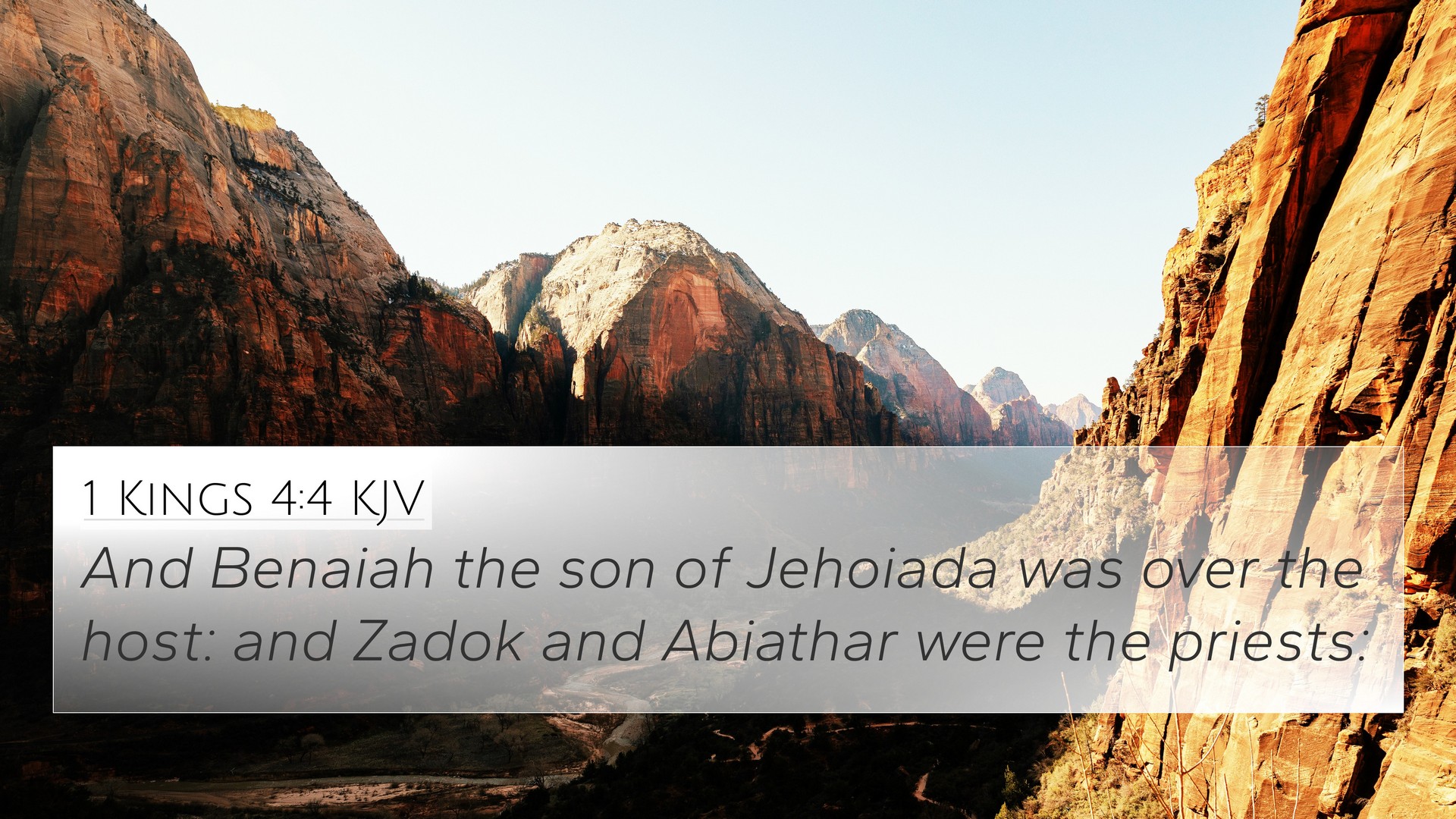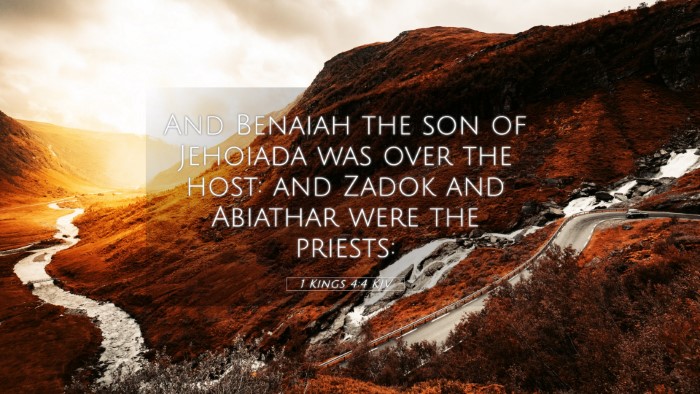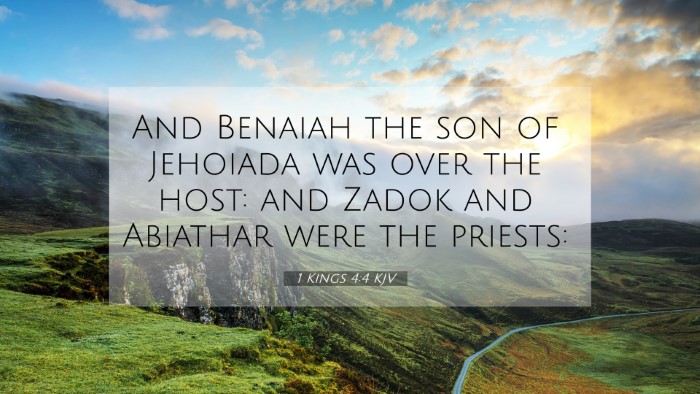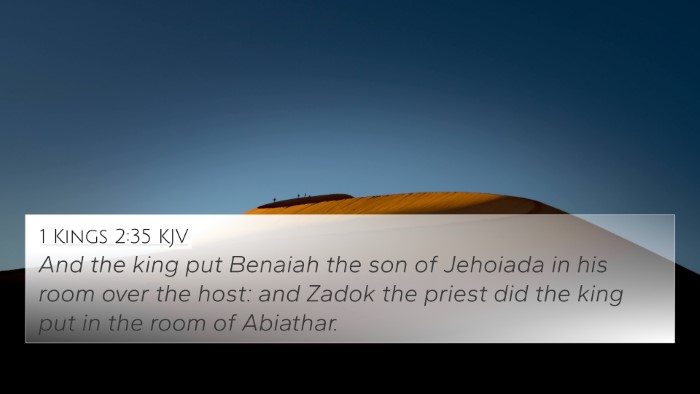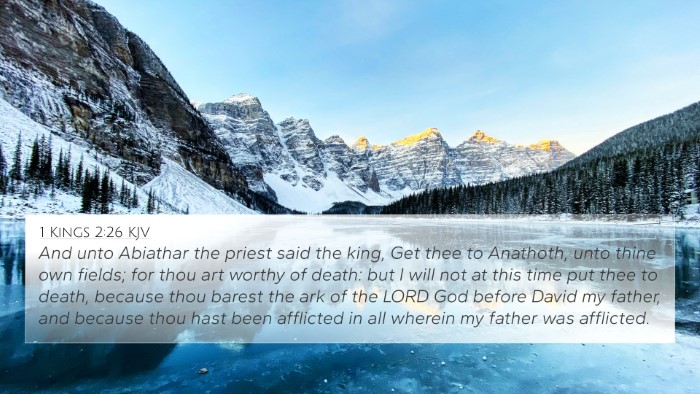Understanding 1 Kings 4:4
1 Kings 4:4 states: "And Benaiah the son of Jehoiada was over the army: and Zadok and Abiathar were the priests:" This verse highlights the roles of two key figures in King Solomon's administration, reflecting the organizational structure of his kingdom.
Commentary Insights
-
Matthew Henry’s Commentary
Matthew Henry emphasizes the importance of Benaiah, noting his valor and wisdom as the commander of Solomon's army. He draws attention to how Solomon assembled a team of capable leaders, which was essential for maintaining peace and order in a newly established kingdom.
-
Albert Barnes’ Notes on the Bible
Albert Barnes elaborates on the position of Zadok and Abiathar as the priests, indicating their roles in the spiritual guidance of the nation. He points out the significance of having reliable leaders who could uphold both military and spiritual authority in Israel.
-
Adam Clarke’s Commentary
Adam Clarke draws parallels to earlier biblical characters, underscoring the continuity of leadership roles. He highlights how spiritual and military powers were often intertwined in ancient Israel, leading to a more unified governance under Solomon.
Key Themes and Cross-References
This verse opens up several key themes in the biblical narrative, notably leadership, authority, and the relationship between military and religious roles in governance. Here are important cross-references that deepen the understanding of this verse:
- 2 Samuel 8:18: Highlights Benaiah's earlier service under David, establishing continuity in Israel's leadership.
- 1 Chronicles 18:17: Further details David’s military structure, including Benaiah's role.
- 1 Kings 2:35: Focuses on Solomon's ascension and the establishment of Benaiah's position as commander.
- Ezra 7:1-5: Reflects on the priestly lineage from Aaron, connecting Zadok and Abiathar’s roles with the ongoing priestly duties in Israel.
- Matthew 26:57: Mentions Caiaphas as the high priest, drawing parallels between priestly leadership in different biblical contexts.
- Hebrews 5:1: Discusses Christ as the high priest, linking Old Testament priests like Zadok to the ultimate priesthood of Jesus.
- Acts 6:7: Describes the growth of the early church and the importance of spiritual leaders, echoing the significance of Zadok and Abiathar's leadership in Israel.
- Revelation 1:6: Encompasses the concept of believers as a royal priesthood, connecting back to the roles established in the Old Testament.
Thematic Connections
The connection between military leadership, depicted by Benaiah, and spiritual leadership, portrayed by Zadok and Abiathar, reveals a significant theme throughout the Bible: the intertwining of faith and governance.
- Leadership Qualities: The emphasis on wise governance can be explored through other verses, such as Proverbs 11:14 and Proverbs 29:2, which advocate for wise leaders who seek counsel.
- Covenantal Community: The interplay between priests and kings is a recurring theme; similar dynamics can be found in Exodus 19:6 and 1 Peter 2:9, which reflect on the identity of God's people as a chosen and holy community.
Inter-Biblical Dialogue
This verse provides a dialogue between the Old and New Testaments, illustrating how the structural framework of leadership in Israel sets the stage for understanding Christ’s fulfillment of these roles. The continuity can be reflected upon in various comparative studies:
- Comparative Analysis of King David and King Solomon: Examining the transition from David to Solomon, we see patterns in leadership styles and administrative structures, further reflected in the New Testament’s development of church governance.
- Biblical Priests and New Testament Church Leaders: This connection adds depth to how we view the role of spiritual leaders today, linking to themes found in the Pastoral Epistles.
Using Cross-References in Bible Study
Understanding the layout of 1 Kings 4:4 requires the use of tools for Bible cross-referencing. A well-developed Bible cross-reference guide or a reliable Bible concordance can enhance your study. By actively engaging in cross-referencing Bible study methods, individuals can better observe the thematic Bible verse connections present throughout scripture.
To deepen your understanding, consider these Bible reference resources that provide extensive information on how to find and use cross-references effectively, supporting your Bible cross-reference system implementation.
Conclusion
In summation, 1 Kings 4:4 serves as a critical piece that integrates military and priestly leadership while emphasizing the importance of wise governance based on divine principles. The insights from prominent commentaries, alongside the cross-referenced scriptures, provide a robust framework for understanding how leadership in the Old Testament resonates with New Testament teachings and practical implications for today.
This verse invites reflection on our own leadership and spiritual responsibilities within our communities as we strive to emulate the faithful examples set forth in scripture.
